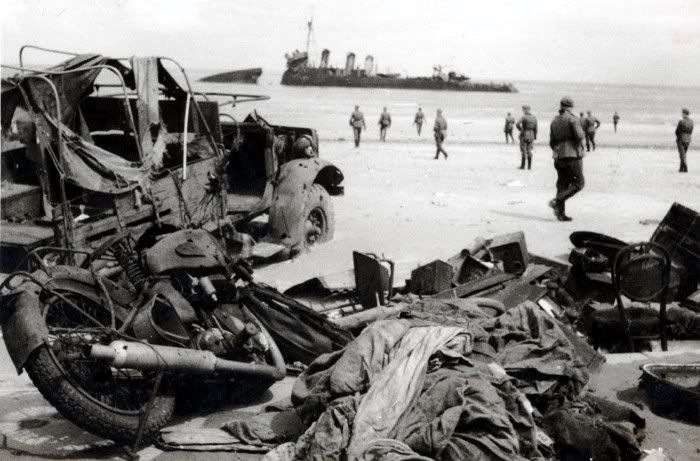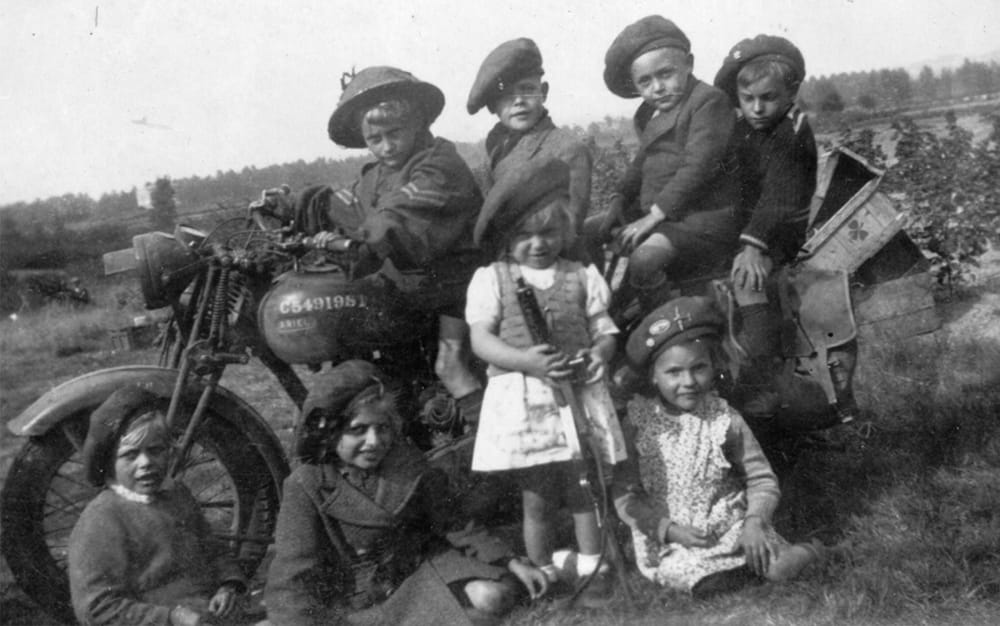I just received a picture of an M20 toolbox with 3 holes in it at the location of the toolbox knob with the question what kind of knob should this toolbox have.
My first idea was that this couldn't be original until I took a look in my picture collection.
Look at the toolboxex, does any of you have an idea about this?
Henk






email (option): ahum@quicknet.nl
The bike in the website pic. also has the same feature..isn't this described in a 38 or 39 parts list?...Any component parts should be listed. I would hazard a guess at some kind of spring clip held to the inside of the lid of the box so that it 'snapped' shut and could just be pulled open.....Ian
email (option): julie@wright52.plus.com
It would be interesting to find such a toolbox. Could this just be a military conversion done by BSA but not mentioned in the parts lists?
It seems to me that the hole in the middle on the new photo is to large.
Henk.
email (option): ahum@quicknet.nl
Is the later retainer a screw ? This Malo-les-Bains picture shows an open cover with clearly a stud mounted on that short strip across the corner.

Surely they didn't rely on some sort of spring-loaded slam catch to keep the lid closed ? No wonder it was quickly changed and that so many have extra hasps on.
It does indeed look as if the box in the recent picture has a larger hole bored.
Most decent pictures of early M20s are, like Nortons, taken from the drive side. Strange.
There doesn't appear to be any type of fastener/screw etc. between the two screws/rivets in the original photos. The suggestion that there may have been a 'slam catch' is only a guess based on a possible method likely to be 'of the period' that could have been used to retain the lid.
It seems there were difficulties coming up with a fastener that suited the military's requirements...The lock and hasp may well have been fitted to overcome the problem of an ill conceived closure method.
It appears the first screw in fastener was not fully effective either as this was replaced with the 'toggle' fastener which was designed not to unscrew if it became loosened....Ian

email (option): julie@wright52.plus.com
Could it be some sort of locking mechanism, like a dresser drawer lock ? In which case, I could see the logic in replacing with something more basic, ie the threaded closure, once keys started to get lost on a regular basis..
email (option): vinver@ns.sympatico.ca
I looked in my Instruction book with a contractnumber C5110 and engine number WM20-5001 and there is on page 25 a photo with the same toolbox without knob.
It does have the same mudguard as on the first photo from Henk.
email (option): bsa-m20@libero.it
The drawing in the instruction book for Contract C3655 for KM20's with frame number KM20 3001 up to KM20 4602 show a similar drawing. No toolbox knob visible. The problems is that these are drawings are artist impressions but it could be what he saw when drawing it.
Henk.

email (option): ahum@quicknet.nl
There did seem to be a short period in the early part of the war when the government demanded lockable tool boxs and this looks like part of that development.
Do we know which contract this M20 is from?
email (option): robmiller11@yahoo.co.uk
That bike has matching numbers which are KM20 5012. I can't find any information about a contract for that number.
Some photos seems to show a small hole between the two rivets, could be some sort of key hole?
Henk.
email (option): ahum@quicknet.nl
Its listed in "O&M" so presumably its in the BSA ledgers as supplied to the War Office.
I see its got rear foot rests, is that normal for a KM20?
email (option): robmiller11@yahoo.co.uk
It might not have it's original rear frame anymore?
Henk
email (option): ahum@quicknet.nl
It could be that impressed civilian KM20s had rear footrests and Military contract KM20s didn't, have you got a photo from the other side showing sidecar lugs ect.
email (option): robmiller11@yahoo.co.uk
I'll ask the owner of that bike for some more photos.
Henk.
email (option): ahum@quicknet.nl
There seem to be far too many pictures of M20s fitted with this fastener for them to be 'impressed' bikes. Bearing in mind that the M20 had been in production as a military bike since 1937 and only 600 machines covering all types were requisitioned from the factory in the early stages of the war.
The bike in the original posting could have had the rear frame section (or toolbox/front frame section!)changed at any time. Interestingly it does have the screw in oiltank cap though and that was a civilian bike feature. The Irish bike in the website pic also has this fastener and if the rear light is indicative of age is a 1940 model. Some 1939 and 40 and possibly earlier bikes therefore appear to be thus equipped so it must be reasonable to conclude it was the standard military type...why it doesn't appear under part numbers is very odd...has anyone looked at a 37 and 38 parts list yet?....Ian

email (option): julie@wright52.plus.com
Henk. I think you will find that this screw type catch, as the box is closed there is a twist cheese head screw that goes a shaped spring wire on the inside of the box & is locked by a half turn.
IKBA applies. TTJohn
I guess its a standard 1939 civilian bike with no Military components at all except maybe the toolbox if it does turn out to be a special military catch??????
Does it have the wide Military toolbox or the narrow civy one?
email (option): robmiller11@yahoo.co.uk
the hole look the same as those when a durz type fixing is used ie as on aircraft pannel i am not sure but werent the early type civi tool box lids just clipped up via a small ridge on the box its self with a small indentation on the lid which you would need a good set of finger nails to get it undone
email (option): roger.back@node6.com
The American 'Dzus' fastener was used in the 30's primarily on Aircraft and was produced domestically in Britain from 1939. I don't know of any bike equipped with this type of fastener in the pre war period but its use is entirely possible. Postwar BSA did use Dzus fasteners on Swinging Arm models for the toolbox...perhaps it was the M20 toolbox that gave them the idea! Cost and crucially availability may have been factors in the replacement of the fastener (if it was that type that was used) as all production from the English plant was absorbed into wartime production.
It wouldn't have been any deficiency in the operation of the Dzus fastener...they were specifically designed to resist vibration and not to come completely undone if loosened...after all, you wouldn't want the engine covers flying off your Spitfire at 400mph!!.The problem is that the screw fastener for the Dzus (it had to be turned through 1/4 of a turn to operate) doesn't seem to be visible in the photos and at least on the post war types the fastener is retained by a clip...not two screws /rivets....Ian
email (option): julie@wright52.plus.com
Here two pictures taken at the beach of Dunkirk so that must be 1939 or 1940 bikes, by coincidence both have their toolbox lid missing. Could the answer be found there? These toolboxes are different, I wonder what the toolbox looks like on the inside of the KM20 owned by Jacques.
Henk.


email (option): ahum@quicknet.nl
Also! Has the fork damper on that black bike been put in the wrong place? Ron
email (option): ronpier@talk21.com
Well spotted Ron...And is it/was it in America?. I think this one is a civilian model..I can't see any military components apart from (possibly) the toolbox. It's not clear from the photo whether it is the wider type. There is something about this bike that doesn't seem quite right, but I can't work out what it is..it seems like it has been 'faked up' in some way. What is the background story on this one Henk?....Ian
email (option): julie@wright52.plus.com
on the photo of the bike on its own that henk put up the toolbox lid has the type of fasner that is a peg with 2 notches in locates onto the spring and to unlock you would turn it which will open the spring thereby letting you open the lid and just closing it will lock the lid
email (option): roger.back@node6.com
This bike is owned by a Dutch guy that puts all his bike in front of the setup to take picture. I have shown some more pictures of this bikes some time ago on the forum page. Most are nearly as nice as Ron's collection 
email (option): ahum@quicknet.nl
I knew it...he's the guy who is good at 'patina'!!
 ...nice bike never the less...Ian
...nice bike never the less...Ian
email (option): julie@wright52.plus.com
He is going change it to a military M20.
Henk
email (option): ahum@quicknet.nl
Were there any Military M20s with the controls in the petrol tank?
email (option): robmiller11@yahoo.co.uk
I have one war time picture of such a bike, but that is probably an impressed bike. That's what you call it in English I think? An impressed bike?
Henk
email (option): ahum@quicknet.nl
Well I'm impressed have we seen this picture?
have we seen this picture?
email (option): robmiller11@yahoo.co.uk
Impressed is the right word Henk...Back in the 1700s and 1800s when people were required for the Army and particularly the Navy, patrols would go around the pubs and haul away the drunkards. When they sobered up the next day they would find themselves in the service of the King/Queen...they had been 'impressed' into the services. An abbreviated version of the word was used for these patrols..they were known as 'Press Gangs'. So, a 'civilian' bike that was taken into the services was 'impressed'
Of course, this is English so there is another, completely different meaning!!....Ian

email (option): julie@wright52.plus.com
Right, we have to keep on searching.
Henk
email (option): ahum@quicknet.nl
What is the purpose of the spring that goes from the kickstart?or cover screw...to the exhaust pipe mounting?
 ..Ian
..Ian
email (option): julie@wright52.plus.com
Definitely a wide military toolbox then.
I looks like the catch may have been removed recently judging by the lack of paint?
Also a nice ribbed rear brake drum, I wonder if the front footrests are the military drilled and tapped type?
email (option): robmiller11@yahoo.co.uk







